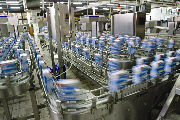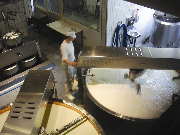 Given the recent scandals that have blighted the food industry, consumers are now acutely aware of just how processed much of our food is. In light of this, there is mounting pressure from the consumer for manufacturers to deliver sustainable and responsible food products. Traceability solutions have become much more sophisticated in recent years, delivering unprecedented value for those looking to ensure the safety of food products. Mark Staples, food and beverage segment manager from Schneider Electric explains how food manufacturers can provide transparency and efficient traceability, in order to maintain the confidence of their distributors and the public.
Given the recent scandals that have blighted the food industry, consumers are now acutely aware of just how processed much of our food is. In light of this, there is mounting pressure from the consumer for manufacturers to deliver sustainable and responsible food products. Traceability solutions have become much more sophisticated in recent years, delivering unprecedented value for those looking to ensure the safety of food products. Mark Staples, food and beverage segment manager from Schneider Electric explains how food manufacturers can provide transparency and efficient traceability, in order to maintain the confidence of their distributors and the public.
A recent study by Mintel found that the number of British consumers who are now buying local, British produce has risen significantly in the wake of this year’s food scandals. Of those surveyed, 14 per cent stated that traceability was now an important part of their purchasing decision, in comparison to just 6 per cent at the end of last year1.
The scandals that blighted the food manufacturing industry have further added to the mounting challenges the sector is currently facing. These include the increasing costs of raw materials, competition from cheaper imported food, the need for greater flexibility and compliance with a raft of legislation – not to mention the increasing call from consumers to ‘go green’.
As supermarkets have come increasingly under the spotlight, so too have the manufacturers who supply them. Consumers now want to know exactly where their food is sourced from and precisely what goes into it – a trend that looks set to grow.
Manufacturers must now take a holistic view of their processing plant; can a process be automated to help reduce the risk of contamination? How can I ensure that end-users are happy with the overall product and be confident that we can provide them with a fully traceable item? Can changes be easily made to the packaging system to increase efficiency and reduce its environmental impact? Where can cost savings be made to increase profit margins?
The solution to these issues is automation and digitalisation. By automating processes that currently operate manually, it is possible to greatly reduce error, heighten security around certain areas of the processing stage and improve overall energy efficiency.
Digitalising processes also enables food manufacturers to collect data from each step of the way, which can generate corrective actions quickly. By providing plant operators with this level of detail, they can swiftly identify any defective product batches and recall them. Once the issue has been dealt with, manufacturers can then trace back to the cause of the problem, helping them to avoid the situation in the future.
By utilising cloud based software, such as Schneider Electric’s StruxureWare®, food manufacturers can access the data from multiple locations, in real time. By storing vital information off-site, manufacturers can be confident that the information is also stored securely, reducing the risk of tampering by a third party.
Of course digitalisation will also vastly improve the traceability of the food being produced. For example, supermarket customers can now trace the exact location of where their tuna was caught simply by scanning a code on the side of the tin into their smart phones. This can then be traced through the manufacturer’s cloud based system, all the way back to the source of the product. This technology is becoming more and more appealing to discerning consumers who are interested in the origins of the food they are eating.
For many manufacturers, the idea of automating and digitalising a plant can seem daunting, as well as costly. Many of their existing systems have not been synchronised to meet today’s and tomorrow’s needs. However, not all of the legacy equipment and software will need replacing, so the challenge is to find a solution that is flexible enough to enable plant operators to preserve their valuable resources that are still functional, while updating the plant where possible.
 By embracing cloud based, open architectures, plant operators can conserve some of their existing control assets and pave the way for a step-by-step program of system migration, designed to integrate new technologies over time. By ‘bridging’ the technology gap, plant operators can choose the speed at which they automate their plant in line with their own budgets and timescales.
By embracing cloud based, open architectures, plant operators can conserve some of their existing control assets and pave the way for a step-by-step program of system migration, designed to integrate new technologies over time. By ‘bridging’ the technology gap, plant operators can choose the speed at which they automate their plant in line with their own budgets and timescales.
As an energy management specialist, Schneider Electric can work alongside manufacturers to help them to remain competitive, while retaining as much flexibility as possible. This will allow them to quickly adapt to the rapidly changing needs of the consumer and create a product that will meet all of the relevant guidelines.
Automating and embracing the digital world is the solution to many of the issues facing the food manufacturing industry. Consumers are more aware than ever, just how processed much of what we eat really is. Therefore now is the time to act, in order to safeguard the industry against another crisis that may be felt even deeper than the recent scandal and put the industry in jeopardy.
By investing in new cloud based technology today, with help from energy management specialists such as Schneider Electric, food manufacturers can embrace the digital world, enabling them to adapt to what consumers want now, and in the future.
1. Mintel


